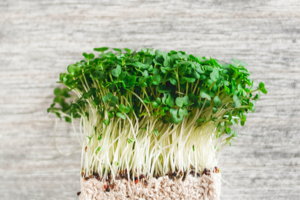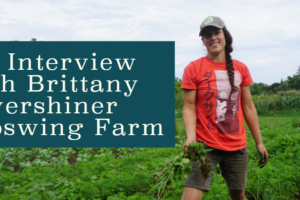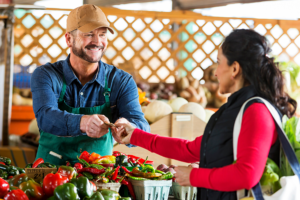
Caroline Pam and Tim Knox of Kitchen Garden Farm
Kitchen Garden Farm is a fifty-acre farm in the Pioneer Valley, the prime agricultural region of Western Massachusetts. They produce veggies, as well as making their own incredibly successful line of hot sauces and salsas. Caroline and Tim started the farm in 2006, and began using the LFM platform in 2014. However, when COVID-19 hit, Caroline and Tim realized that they needed a new solution to make it through without restaurant sales, and they needed to make a change quick.
They immediately teamed up with Riverland Farm and Warner Farm in Sunderland and Queen’s Greens in Amherst to create Sunderland Farm Collaborative. We spoke to Caroline about pivoting from a solo-producer to a farm collective and beginning sales all within one week using their LFM platform.
Download the Kitchen Garden Farm Case Study
LFM: Hi Caroline! If you would, give me a little background about your farm?
Caroline: My husband and I own Kitchen Garden Farms in Sunderland, MA where we grow fifty acres of certified organic vegetables. We make products like hot sauce, salsa, pickled vegetables, and tomato sauces from our own ingredients…we make all that on site at the farm in our kitchen. We have been selling our produce and products to restaurants locally – but also in New York and Boston through distributors, and to Rhode Island, Western Berkshires, etc. We sell a lot of vegetables. We also sell our products to the Whole Foods throughout the Boston region (also, now in New York) and we ship directly to retailers all across the country.
LFM: How long have you been using the LFM platform?
Caroline: We’ve been using LFM since 2014. We were one of the first farms that used for just our farm because it had the capacity that I needed. At the time, we didn’t need any of the foodhub features for multiple farms – but the order management was essential. By adding online ordering, I didn’t have to type up invoices. Then, being able to sort it out into harvest lists, a pack list, then to the washroom, then to create case labels using my dymo thermal label printer for all the boxes – these have been essential to us being able to scale up to the volume of orders we manage daily without going crazy.
LFM: What was that process like, pre-LFM?
Caroline: In the old days, I would send out an email twice a week to my customer list and then I would receive dozens of emails for every harvest day. I’d have to type all that into QuickBooks to generate invoices, and I would separately have to type them into a spreadsheet to tally up the harvest totals and separately I would format that into a different type of spreadsheet based on what was getting packed for whom. So that was hours of labor at my dining room table- basically all night before harvest.
LFM: The next piece I wanted to ask you about was how the COVID-19 epidemic has impacted your farm. What has that been like?
Caroline: When the stay at home orders came into effect and the restaurants were told to close, we were facing a very uncertain market for our products. Typically, we sell fifty percent of our vegetables to restaurants. We realized that we were going to have to find a new way to sell vegetables – because we wanted to continue growing all the vegetables we can grow on our land, and we knew that there would still be a need for folks to get access to the food but…. it wasn’t really possible to expect to sell the same kind of volume to restaurants that were closed.
But we were familiar with [the LFM] software, and we knew it had the capability to do direct to consumer sales collaboratively with other farms. [This is when Kitchen Garden Farm teamed up with Riverland Farm, Warner Farm, and Queen’s Greens to create the Sunderland Farm Collaborative.] Within literally a week we were able to launch a live site with twelve producers, and make the first delivery to individual consumers through a couple of pickup and delivery sites.
LFM: That’s so great. How’s it been since the transition?
Caroline: It’s been a wild ride. We’re currently fulfilling 800 orders per week. It’s a lot!
LFM: In general, does it feel like LFM gives you and the other farms in the collective a competitive edge?
Caroline: From the beginning, I felt like having the professional online storefront made us seem like a really forward thinking, professional business. With COVID-19, our ability to harness the platform so quickly put us out ahead of everything and drove a lot of the immediate demand our way. Having the system already built for this purpose (and knowing I could implement it quickly) was definitely key to our quick ability to capture these sales.
LFM: Is there something you would tell another farm that is considering using LFM?
Caroline: I have personally sent dozens of businesses to LFM. I think that it’s the right tool for the job! It has all the capabilities that you need. Once you invest the time to get it set up – it can honestly save you ten to twenty hours of manual work every week.



